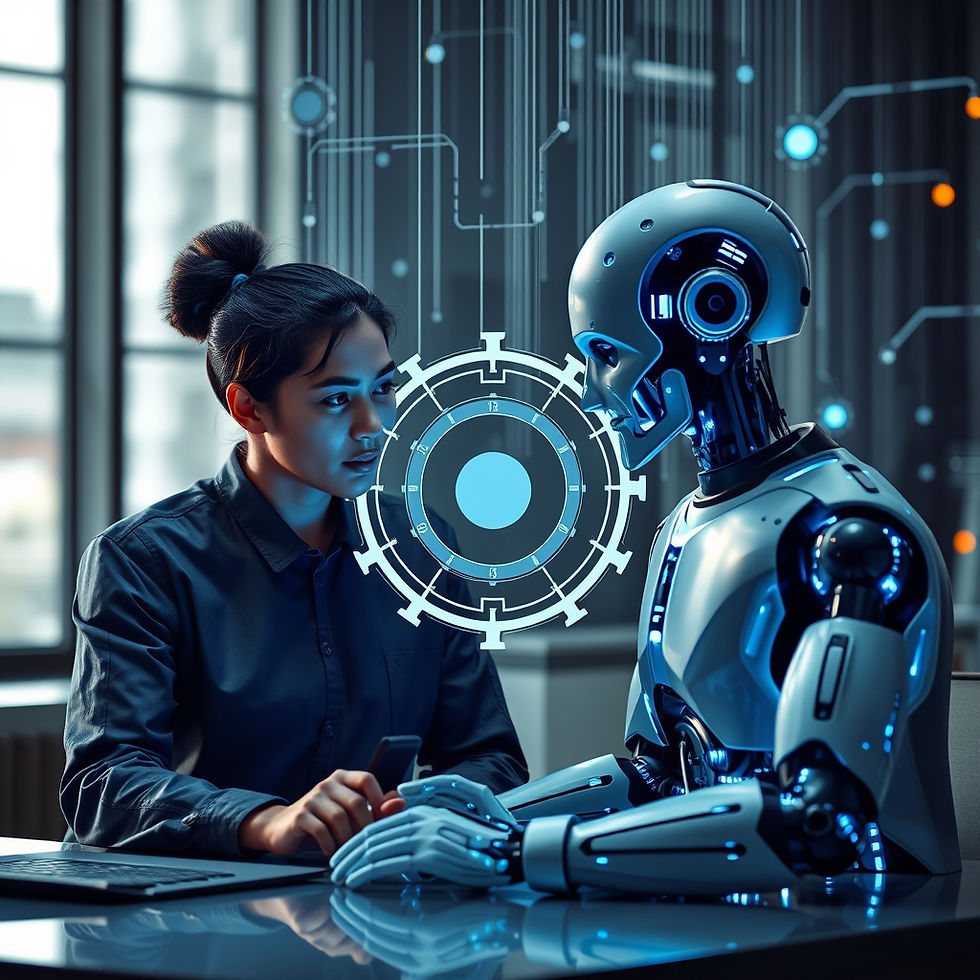AI and the Future of HR Professionals
- Khurram Rana
- Jan 16, 2023
- 3 min read

Artificial Intelligence (AI) has already begun to change the way companies operate and has had a significant impact on many industries.
While AI can automate certain tasks and make processes more efficient, it's unlikely that it will completely replace the need for human resources professionals. Phew...
Human resources professionals play a critical role in managing and developing a company's most valuable asset, its people.
They are responsible for recruiting, hiring, and training employees, as well as managing employee relations and ensuring compliance with labor laws.
These are tasks that AI is currently not advanced enough to handle and even if it does, these tasks require human touch, empathy, and decision making skills that AI doesn't possess yet.
AI can be a valuable tool for HR professionals, helping them to automate certain tasks, such as screening resumes, scheduling interviews, and tracking employee data. Already such tools like Skillate or Turbohire and many other are being used to reduce the time spent screening resumes. Some even have games based assessments.
However, the role of HR professionals will continue to evolve and they will need to adapt to the changing landscape of the workplace. They will continue to play a critical role in managing and developing the company's human capital and in promoting a positive culture.

Can AI based recruitment replace human recruiters?
AI-based recruitment has the potential to be more efficient and objective than human recruitment, but it also has its own limitations.
AI-based recruitment tools can automate certain tasks such as screening resumes, scheduling interviews, and tracking employee data, which can save time and reduce human error. AI-based recruitment systems can also be programmed to identify and select the most qualified candidates by analyzing resumes and job applications, and conducting initial interviews.
AI-based recruitment can also help to reduce bias in the recruitment process by removing the potential for human bias in the selection of candidates. AI-based systems can be trained to focus on specific qualifications and skills required for the job, rather than personal characteristics or other factors that may be unconsciously biased.
However, AI-based recruitment systems are not perfect, and are limited by the data and algorithms that they are trained on.
They can be limited in understanding the nuances of human language, and can make mistakes in identifying qualifications or skills. They also lack the human touch and empathy that is required in the recruitment process, which is important in assessing the candidate's fit with the company culture.
For these reasons, AI-based recruitment is best used as a tool to support the recruitment process and not replace the human recruitment.
Human recruiters must continue to be involved in the recruitment process to evaluate the candidates and make the final hiring decisions. A combination of both, AI and human recruitment can give the best results.
Can AI make decisions in ethical or employee related concenrs?
AI can be programmed to identify certain patterns or anomalies that may indicate an ethical concern, but it cannot make a judgement call on an employee ethical concern. Judgement calls require the ability to interpret and apply ethical principles, which is a complex task that requires human reasoning and understanding.
AI can be used to help identify potential ethical concerns, such as by analyzing employee emails, chat logs, or other forms of communication for keywords or patterns that may indicate an ethical violation. However, the decision on whether or not an ethical violation has occurred and what action to take in response to it, ultimately requires human judgement.
It's important to note that AI is only as good

as the data it's trained on and the algorithms it uses. If the data and algorithms contain biases or errors, the AI system may make incorrect or unjust judgement calls. It's important to regularly review and update the data and algorithms to ensure that the AI system is functioning correctly.
AI can be used to assist in identifying employee ethical concerns, but it cannot make judgement calls on those concerns. Human judgement and interpretation is required for making ethical decisions.
AI can help HR professionals to work more efficiently and effectively, but it's unlikely to completely replace the need for human resources professionals.
The role of HR professionals will continue to evolve and they will need to adapt to the changing landscape of the workplace.










Comments